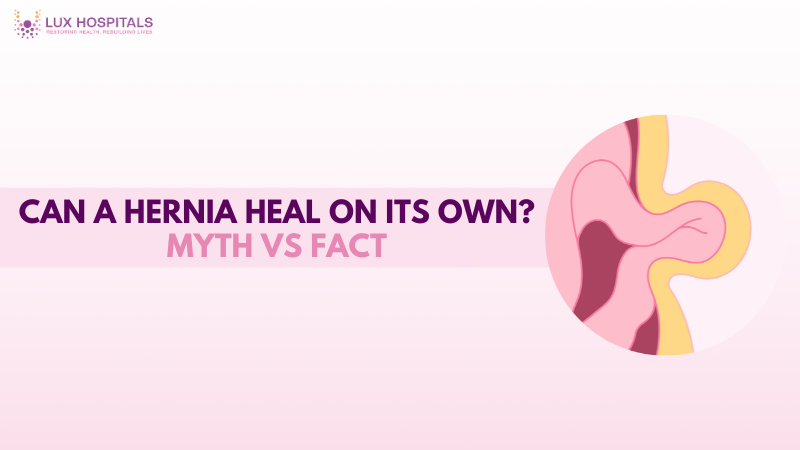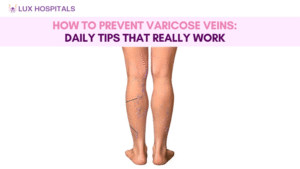Can a Hernia Heal Without Surgery? Myth vs. Reality

A hernia occurs when an internal organ pushes through a weak spot in the surrounding muscle or tissue. It can occur in areas such as the abdomen, groin, or upper thigh, often causing discomfort, swelling, or pain. Many people wonder: Can a hernia heal without surgery? The short answer is that most hernias don’t heal on their own and may worsen over time, but misconceptions about “natural healing” still exist. Let’s break down the most common myths and reveal the real facts so you can make informed health decisions.
What is a Hernia?
A hernia is a medical condition in which part of an organ, often the intestine, bulges through an opening in the muscle or tissue that usually holds it in place. This happens when the muscle wall becomes weak or torn, creating an opening. Certain hernias are asymptomatic, but others can be uncomfortable or even excruciating, particularly when lifting or coughing—activities that raise abdominal pressure.
Types of Hernias
- Inguinal Hernia: The most prevalent kind, an inguinal hernia, develops in the groin region when tissue pushes through the abdominal wall.
- Hiatal Hernia: Happens when the diaphragm allows a portion of the stomach to push up into the chest
- Umbilical Hernia : Occurs near the belly button when part of the intestine bulges through the abdominal wall.
- Incisional Hernia : An incisional hernia forms where a prior surgical scar was. Scar due to weakened tissue.
- Femoral Hernia: Found in the upper thigh or groin, more common in women.
Knowing the type of hernia you have helps in deciding the proper treatment approach.
Common Myths About Hernia Healing Without Surgery
Many people believe that a hernia can heal naturally with rest, exercise, or supportive belts, but these ideas are misleading. While such measures may reduce symptoms temporarily, they do not repair the underlying muscle defect. Understanding these myths and the real facts can help prevent complications and ensure timely treatment.
Myth 1: A Hernia Will Go Away with Rest
Fact: Resting may temporarily reduce hernia symptoms, but it will not repair the muscle weakness.
When you lie down, the bulge shrinks because gravity is not pushing the organ outward. However, the tear in the muscle wall remains, and as soon as you resume daily activities, the hernia can reappear or worsen. Without surgical repair, the weak spot stays vulnerable, and the risk of complications such as strangulation remains.
Myth 2: Exercise Can Cure a Hernia
Fact: Certain exercises can strengthen surrounding muscles, but they cannot “close” a hernia.
While core-strengthening workouts improve abdominal support, they do not repair the actual defect in the tissue. Strenuous lifting or high-pressure exercises can make the hernia larger and more painful. Doctors may recommend gentle activity for prevention and recovery after surgery, but not as a replacement for surgery.
Myth 3: Wearing a Hernia Belt or Truss Is a Long-Term Fix
Fact: Hernia belts may provide temporary relief, but they are not a cure.
Support garments help hold the hernia in place and reduce discomfort during daily activities. However, prolonged use can lead to skin irritation, muscle weakening, and a false sense of security, delaying necessary medical treatment. Surgery remains the only way to repair most hernias permanently.
Myth 4: If the Pain Stops, the Hernia Is Healed
Fact: Loss of pain doesn’t mean the hernia is gone—it may be a warning sign.
When a hernia becomes trapped (incarcerated) or the blood supply is cut off (strangulated), the pain might suddenly reduce because nerve signals are blocked. This can be dangerous, as strangulated hernias require emergency surgery to prevent tissue death. Ignoring a painless bulge can put your life at risk.
Myth 5: Small Hernias Don’t Need Treatment
Fact: Even small hernias can grow and cause complications over time.
Some people live with small hernias for years without discomfort, but the condition rarely stays stable. Increased pressure from coughing, weight gain, or heavy lifting can enlarge the opening and push more tissue through. Early treatment of a hernia frequently results in a quicker recovery and a safer, more straightforward procedure.
Reality Check: Why Surgery Is Usually the Only Permanent Solution
Surgery repairs the weakened muscle or tissue, closing the gap and preventing organs from protruding. Modern techniques, such as laparoscopic surgery, offer faster recovery, fewer scars, and lower recurrence rates. Although supporting devices and lifestyle modifications can reduce symptoms, they are unable to undo the structural damage that results in a hernia.
When to See a Doctor Immediately?
Seek urgent medical care if you notice:
- Suddenly, severe abdominal or groin pain
- Nausea or vomiting
- A firm, tender hernia bulge that won’t go back in
- Redness or discoloration over the hernia
These might indicate obstruction or strangulation, both of which call for immediate surgery.
Conclusion
It is untrue to say that a hernia can heal without surgery. Although supportive devices, exercise, and rest can help control symptoms, they cannot fix the muscular deficiency. Knowing the truth about these beliefs enables you to make wise decisions and stay safer. If you notice these changes, consult a doctor for evaluation. Complications. If you suspect you have a hernia, consult a healthcare provider early; timely surgical repair can lead to better outcomes and faster recovery.
Frequently Asked Questions
No, a hernia does not heal on its own. The muscle or tissue defect remains, and over time, the condition may worsen. Lifestyle changes can reduce symptoms, but surgery is the only permanent fix.
If left untreated, a hernia may enlarge and cause problems, including strangulation or imprisonment. Tissue death and excruciating pain can result from these disorders' ability to stop blood flow to tissues. In these situations, emergency surgery can be necessary.
Some people manage symptoms with lifestyle adjustments and supportive devices. However, the hernia will not disappear and may still cause future problems. Doctors usually recommend surgery to avoid long-term risks.
Signs of worsening include increased bulge size, more frequent pain, and difficulty pushing the hernia back in. Abdominal straining activities may cause discomfort more frequently. If you notice these changes, consult a doctor for evaluation.
Nonsurgical options include maintaining a healthy weight, avoiding heavy lifting, and using supportive garments. These methods can relieve symptoms but won’t repair the defect. Surgery is required for lasting results.




















